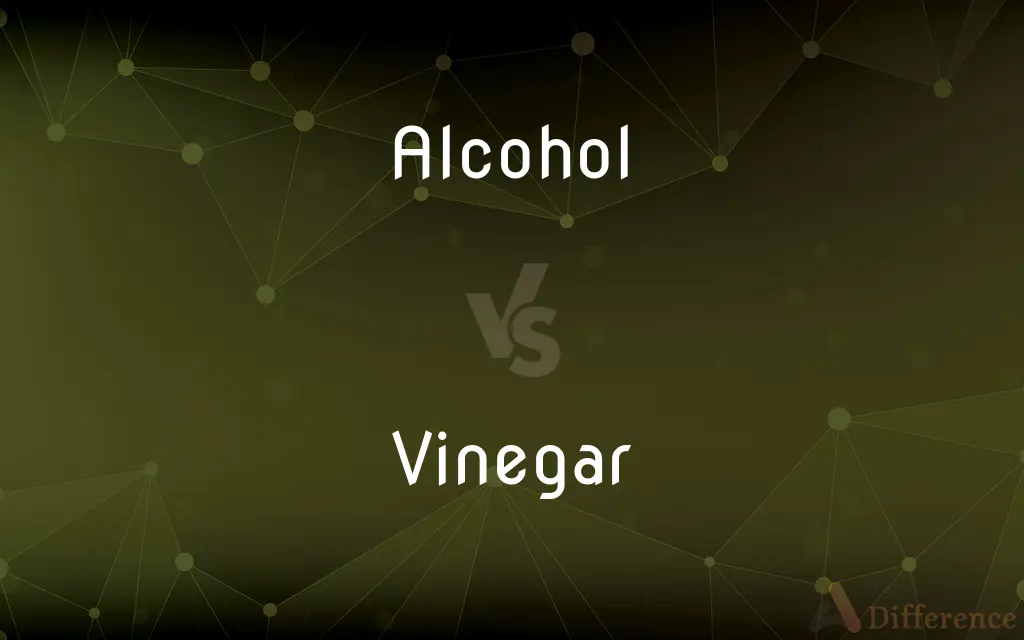Alcohol vs. Vinegar — What's the Difference?
By Tayyaba Rehman — Updated on November 2, 2023
Alcohol is an organic compound with a hydroxyl group; vinegar is a solution mainly consisting of acetic acid and water.

Difference Between Alcohol and Vinegar
Table of Contents
ADVERTISEMENT
Key Differences
Alcohol is a chemical compound characterized by its hydroxyl group, while vinegar is a liquid containing acetic acid and water, often used for cooking. Alcohol is used in beverages, as a solvent, and in sanitizers.
Vinegar, created through the fermentation of ethanol, possesses a sour taste and is commonly used in salad dressings and marinades. Alcohol's properties vary depending on the type but generally include volatility and the ability to burn.
Alcohol serves numerous functions from medicinal to recreational, while vinegar is largely culinary. Alcohol can be intoxicating and is consumed in drinks like wine, beer, and spirits.
Vinegar is used as a cleaning agent, thanks to its acidic nature, distinct from the various uses of alcohol which range from fuel to antiseptics. Each has distinct physical and chemical properties.
While both alcohol and vinegar can result from fermentation processes, their uses and implications in society diverge widely, with alcohol being regulated due to its intoxicating effects, unlike vinegar.
ADVERTISEMENT
Comparison Chart
Definition
Organic compound with a hydroxyl group
Acetic acid solution with water
Use
Beverages, solvents, fuel, antiseptics
Culinary, cleaning, preservative
Production
Fermentation and distillation
Fermentation of ethanol to acetic acid
Taste
Varies by type, often neutral or bitter
Characteristically sour
Effect
Can be intoxicating
Non-intoxicating, used for flavoring
Compare with Definitions
Alcohol
A colorless volatile liquid formed by the fermentation of sugars.
The doctor used alcohol to sterilize the wound.
Vinegar
Often used as a natural cleaning agent due to its acidity.
He used vinegar and baking soda to clean the greasy oven.
Alcohol
Any organic compound with one or more hydroxyl groups.
Rubbing alcohol is a common household antiseptic.
Vinegar
Acts as a preservative because bacteria cannot survive in it.
Pickles are preserved in vinegar for long-term storage.
Alcohol
An intoxicating ingredient found in beer, wine, and spirits.
She chose a cocktail with a low alcohol content.
Vinegar
A sour-tasting liquid containing acetic acid, used especially in cooking and cleaning.
She added vinegar to the salad dressing for extra zing.
Alcohol
In chemistry, alcohol is an organic compound that carries at least one hydroxyl functional group (−OH) bound to a saturated carbon atom. The term alcohol originally referred to the primary alcohol ethanol (ethyl alcohol), which is used as a drug and is the main alcohol present in alcoholic drinks.
Vinegar
Comes in many varieties like balsamic, apple cider, and white.
Balsamic vinegar is her favorite for drizzling over roasted vegetables.
Alcohol
A colourless volatile flammable liquid which is produced by the natural fermentation of sugars and is the intoxicating constituent of wine, beer, spirits, and other drinks, and is also used as an industrial solvent and as fuel
The use of petrol containing alcohol
It is an offence to drive if you have more than 80 mg of alcohol per 100 ml of blood
Vinegar
Vinegar is an aqueous solution of acetic acid and trace compounds that may include flavorings. Vinegar typically contains 5–8% acetic acid by volume.
Alcohol
Any of a series of hydroxyl compounds, the simplest of which are derived from saturated hydrocarbons, have the general formula CnH2n+1OH, and include ethanol and methanol.
Vinegar
A sour liquid containing acetic acid, produced by fermenting a solution (such as wine or fermented rice) containing ethanol produced by a previous fermentation, used as a condiment and preservative.
Alcohol
A colorless volatile flammable liquid, C2H5OH, synthesized or obtained by fermentation of sugars and starches and widely used, either pure or denatured, as a solvent and in drugs, cleaning solutions, explosives, and intoxicating beverages. Also called ethanol, ethyl alcohol, grain alcohol.
Vinegar
Sourness of speech or mood; ill temper.
Alcohol
Intoxicating beverages containing ethanol considered as a group
The national consumption of alcohol.
Vinegar
Liveliness and enthusiasm; vim.
Alcohol
Any of a class of organic compounds (such as ethanol) containing a hydroxyl functional group (-OH).
Vinegar
(uncountable) A sour liquid formed by the fermentation of alcohol used as a condiment or preservative; a dilute solution of acetic acid.
Alcohol
(colloquial) Ethanol.
Vinegar
(countable) Any variety of vinegar.
A range of herb-flavoured vinegars
Alcohol
(uncountable) Beverages containing ethanol, collectively.
Vinegar
(transitive) To season or otherwise treat with vinegar.
Alcohol
(obsolete) Any very fine powder.
Vinegar
A sour liquid used as a condiment, or as a preservative, and obtained by the spontaneous (acetous) fermentation, or by the artificial oxidation, of wine, cider, beer, or the like.
Alcohol
An impalpable powder.
Vinegar
Hence, anything sour; - used also metaphorically.
Here's the challenge: . . . I warrant there's vinegar and pepper in't.
Alcohol
The fluid essence or pure spirit obtained by distillation.
Vinegar
To convert into vinegar; to make like vinegar; to render sour or sharp.
Hoping that he hath vinegared his sensesAs he was bid.
Alcohol
Pure spirit of wine; pure or highly rectified spirit (called also ethyl alcohol or ethanol, CH3.CH2.OH); the spirituous or intoxicating element of fermented or distilled liquors, or more loosely a liquid containing it in considerable quantity. It is extracted by simple distillation from various vegetable juices and infusions of a saccharine nature, which have undergone vinous fermentation.
Vinegar
Sour-tasting liquid produced usually by oxidation of the alcohol in wine or cider and used as a condiment or food preservative
Alcohol
A class of compounds analogous to vinic alcohol in constitution. Chemically speaking, they are hydroxides of certain organic radicals; as, the radical ethyl forms common or ethyl alcohol (C2H5.OH); methyl forms methyl alcohol (CH3.OH) or wood spirit; amyl forms amyl alcohol (C5H11.OH) or fusel oil, etc.
Vinegar
Dilute acetic acid
Alcohol
A liquor or brew containing alcohol as the active agent;
Alcohol (or drink) ruined him
Vinegar
Produced by fermenting alcoholic liquids.
They turned the leftover wine into a rich, flavorful vinegar.
Alcohol
Any of a series of volatile hydroxyl compounds that are made from hydrocarbons by distillation
Alcohol
Used in thermometers and as a solvent in industry.
The laboratory uses alcohol as a solvent for many reactions.
Alcohol
In everyday language, synonymous with ethanol.
The festival prohibits the sale of alcohol to minors.
Common Curiosities
How is vinegar made?
Vinegar is made by fermenting ethanol, which bacteria convert into acetic acid.
How is alcohol made?
Alcohol is typically made by fermenting sugars, which can be further distilled.
Can you drink vinegar like alcohol?
While vinegar is edible, it is not consumed in the same quantity as alcoholic beverages due to its strong acidity.
Is vinegar safe to consume?
Vinegar is safe to consume in the amounts typically used in food preparation and condiments.
What is vinegar?
Vinegar is a solution of acetic acid and water, used in cooking, cleaning, and as a preservative.
Is alcohol used in medicine?
Yes, alcohol is used in medicine, particularly as a disinfectant and antiseptic.
What is alcohol?
Alcohol is an organic compound, often used in beverages and as a cleaning or antiseptic agent.
Is alcohol safe to consume?
Ethanol in beverages is safe when consumed responsibly, but other alcohols like methanol are toxic.
Are there different types of vinegar?
Yes, there are various types of vinegar, including white, apple cider, and balsamic, among others.
Can alcohol be used in cooking?
Yes, alcohol can be used in cooking, often in sauces, stews, and desserts.
Are there different types of alcohol?
Yes, there are many types of alcohol, including ethanol, methanol, and isopropanol, each with different uses.
Can vinegar spoil or go bad?
Vinegar has a long shelf life due to its acidity but can sometimes change in flavor or develop sediment over time.
Can both alcohol and vinegar be used for cleaning?
Yes, both can be used for cleaning due to their antiseptic and acidic properties, respectively.
Can vinegar be intoxicating?
No, vinegar is not intoxicating and contains only trace amounts of alcohol, if any.
Does vinegar have health benefits?
Some types of vinegar, like apple cider vinegar, are believed to have health benefits, though more research is needed.
Share Your Discovery

Previous Comparison
Lent vs. Leant
Next Comparison
Soffit vs. EavesAuthor Spotlight
Written by
Tayyaba RehmanTayyaba Rehman is a distinguished writer, currently serving as a primary contributor to askdifference.com. As a researcher in semantics and etymology, Tayyaba's passion for the complexity of languages and their distinctions has found a perfect home on the platform. Tayyaba delves into the intricacies of language, distinguishing between commonly confused words and phrases, thereby providing clarity for readers worldwide.















































